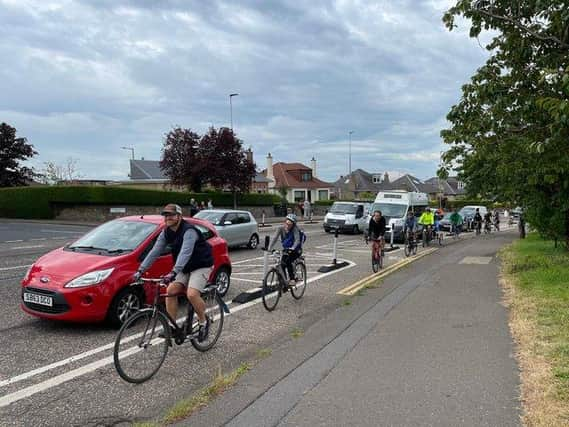Spaces for People: If arrogant Edinburgh council just ignores the public's opinions, what's the point in asking for them? – Robert Aldridge


People had responded in their thousands (around 18,000) to a council consultation. It was one of the largest responses ever. As you would expect, Edinburgh citizens took a sensible and balanced view that improvements around schools on the whole should be made more permanent, but schemes which make it harder for people with disabilities should not be kept.
More local to me, the overwhelming majority said the segregated cycle route on Drum Brae North should be removed. It is barely used and creates a hazard for traffic at the brow of the hill. It is claimed that the empty cycle lanes on Drum Brae are of “strategic significance” – council-speak for not needed, very rarely used, but looks good on paper.
Advertisement
Hide AdAdvertisement
Hide AdDeclaring “this was not a referendum”, the SNP and Labour (with their Green cheerleaders) chose to ride roughshod over the well-thought-through responses which citizens had taken considerable effort to complete.
Their attitude to this consultation is yet another example of them turning away from citizens when they give an answer they simply don’t want to hear. Lib Dems believe that if you have a consultation, it has got to mean something. The clear message the council sends out is that it doesn’t matter what you say they will press on regardless.
It is little wonder that the Spaces for People scheme has become so polarised and it is largely down to the way it has been mishandled. Most of us are very much in favour of making life safer and easier for pedestrians and cyclists. That was the message from the consultation. Lib Dems agree with around 75 per cent of the Spaces for People measures. There could have been a positive route through this.
Instead, by feeding an artificial and unnecessary division between cyclists and motorists, they have undermined the aim we all have of encouraging more people to walk and cycle where they can. Indeed most of us are pedestrians, cyclists, public transport users and drivers at different times. We don’t simply belong to one tribe.
Advertisement
Hide AdAdvertisement
Hide AdWhile hundreds of staff hours have been spent defending the relatively small number of controversial Spaces for People schemes, other road and pedestrian safety schemes have fallen behind. Important improvements like pedestrian crossings which were already scheduled and agreed have fallen behind.
The overwhelming view in my postbag (or inbox) is that there should be a bigger focus on the basics. It is the maintenance and improvement of paths, pavements and roads which will make it far easier for people to walk, wheel and cycle.
It will come as no surprise that in the council’s latest performance report, our roads paths and pavements are showing no improvement.
There is a simple message for the SNP-led council: Edinburgh citizens are wise and thoughtful. If you ask for their opinions, you should listen to them.
Advertisement
Hide AdAdvertisement
Hide AdRobert Aldridge is a Scottish Liberal Democrat councillor for Drum Brae/Gyle and leader of the party’s council group
A message from the Editor:
Thank you for reading this article. We're more reliant on your support than ever as the shift in consumer habits brought about by coronavirus impacts our advertisers.
If you haven't already, please consider supporting our trusted, fact-checked journalism by taking out a digital subscription.
Comment Guidelines
National World encourages reader discussion on our stories. User feedback, insights and back-and-forth exchanges add a rich layer of context to reporting. Please review our Community Guidelines before commenting.
